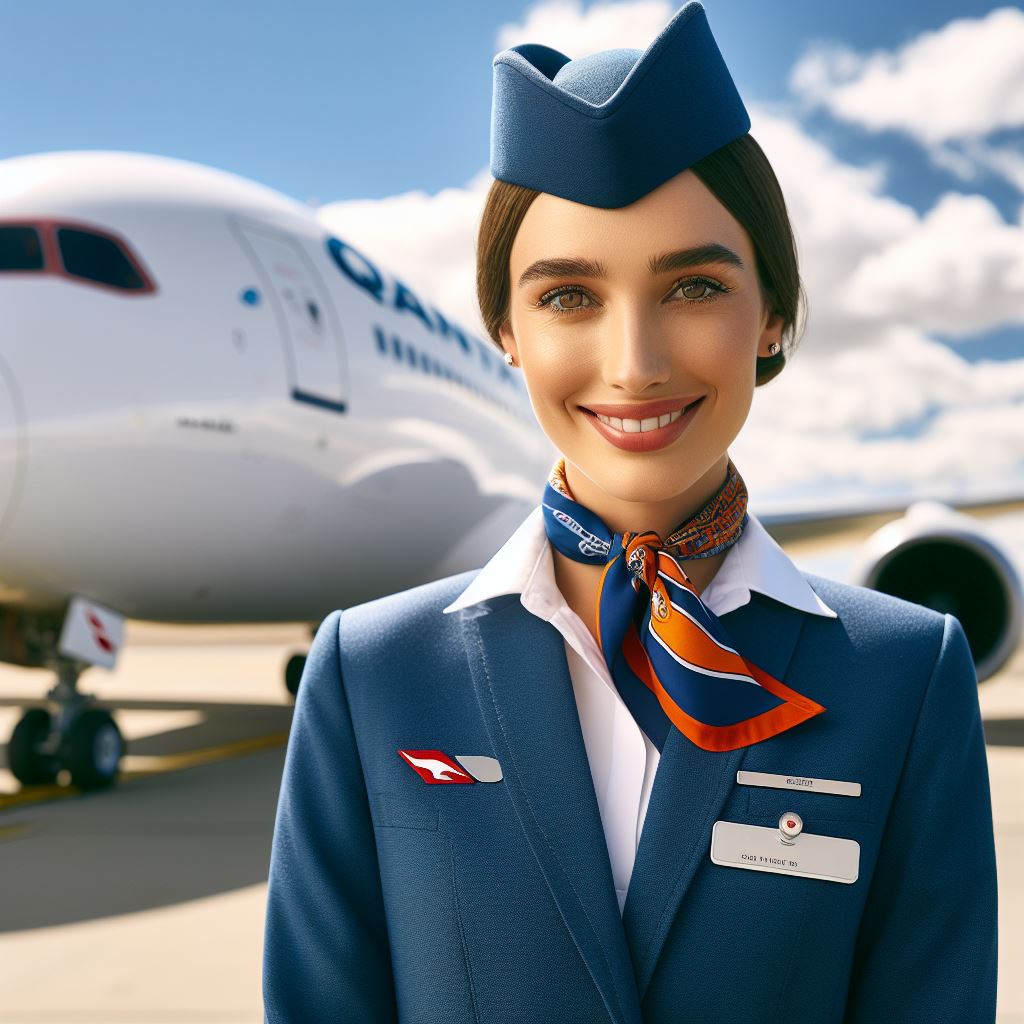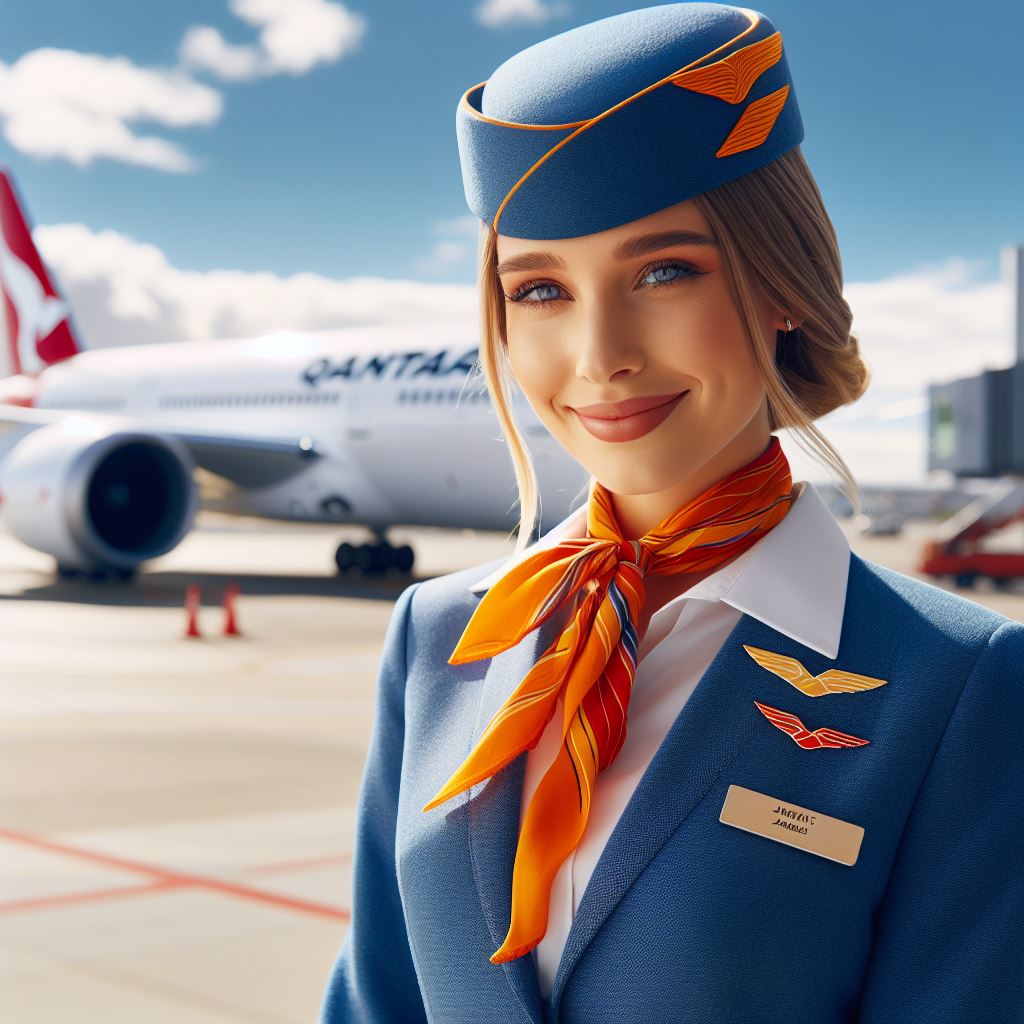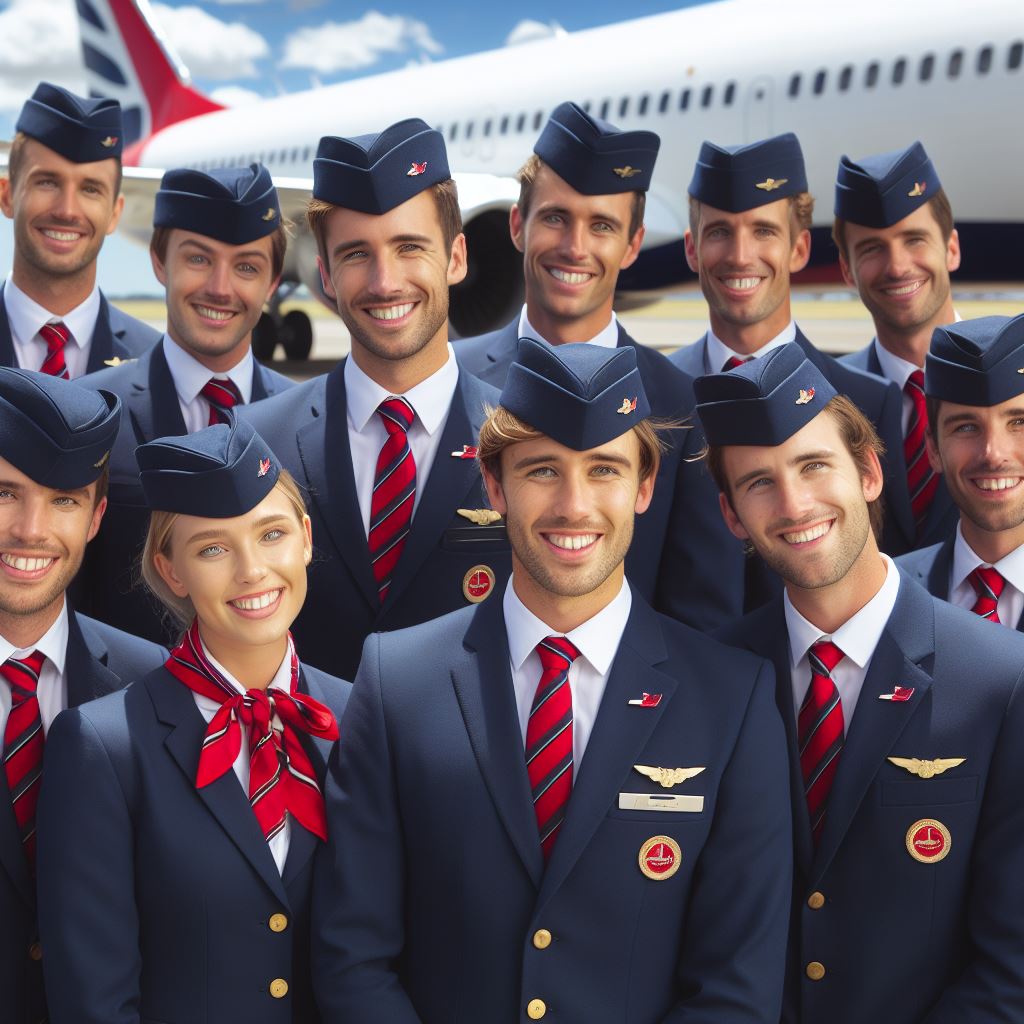Introduction
Understanding the nuances of flight attendants’ salaries is pivotal for individuals contemplating a career in Australia’s aviation sector.
Salaries for flight attendants can fluctuate significantly, influenced by diverse factors such as experience, the airline of employment, and geographical location within the country.
On average, flight attendants in Australia earn approximately $58,377 annually.
However, this figure serves as a midpoint within a broader salary range, spanning from $45,000 to $75,000 per year.
It’s important to recognize that these figures are averages and may vary based on individual circumstances.
Newly qualified flight attendants typically start at the lower end of the salary spectrum but have the potential to increase their earnings substantially as they accrue experience and expertise in their roles.
Additionally, the airline they work for can significantly impact their salary, with some airlines offering additional benefits such as allowances, bonuses, and travel perks.
Flight attendants also have avenues to augment their income over time, including opportunities for promotions, gaining seniority within the airline, and working on international flights.
Understanding these factors is crucial for individuals planning their careers in the aviation industry, enabling them to make informed decisions aligned with their financial and professional aspirations.
Job Description of a Flight Attendant
A flight attendant has various duties and responsibilities during a flight. They are responsible for passenger safety and comfort, as well as providing excellent customer service.
Overview of the duties and responsibilities of flight attendants
- Ensuring passenger safety by conducting pre-flight safety demonstrations and inspections.
- Assisting passengers with boarding, luggage storage, and seat assignments.
- Providing in-flight services such as serving meals, drinks, and snacks.
- Responding to passenger requests, inquiries, and needs during the flight.
- Administering first aid or emergency medical assistance, if necessary.
- Coordinating with the cockpit crew during takeoff, turbulence, and landing.
- Maintaining cabin cleanliness and appearance throughout the flight.
- Ensuring compliance with airline policies, regulations, and security procedures.
Importance of customer service skills and safety training
Flight attendants play a crucial role in providing exceptional customer service to passengers.
They are the face of the airline and are responsible for creating a positive travel experience for all passengers.
Customer service skills such as empathy, communication, and problem-solving are essential for flight attendants to handle various passenger needs and situations.
They must be able to remain calm and professional in stressful situations to ensure passenger comfort and satisfaction.
Additionally, flight attendants undergo rigorous safety training to handle emergencies and ensure the safety of passengers.
They are trained in procedures for emergency evacuations, fire-fighting, and using safety equipment.
Brief mention of the requirements to become a flight attendant in Australia
- Minimum age requirement of 18 years old.
- High school diploma or equivalent qualification.
- Fluency in English and excellent communication skills.
- Good overall health and physical fitness.
- No visible tattoos or body piercings while in uniform.
- Ability to swim a certain distance, depending on the airline requirements.
- Completion of an airline-approved training program.
- Passing a medical and background check.
In Australia, aspiring flight attendants also need to obtain a Cabin Crew Aviation Safety Training Certificate, which covers topics such as aviation safety, emergency procedures, and crew resource management.
Becoming a flight attendant requires a combination of customer service skills, safety training, and meeting specific requirements.
It can be a rewarding career for those who enjoy travel, working with people, and ensuring passenger safety and comfort.
Read: Supply Chain Analysts: Certification Guide
Average Flight Attendant Salaries in Australia
Presenting statistics and data on average flight attendant salaries
Flight attendants in Australia earn on average a salary ranging between $45,000 to $90,000 per year.
The average salary for a flight attendant is influenced by a variety of factors.
Comparison of salaries between domestic and international flights
Flight attendants working on international flights typically earn higher salaries compared to those on domestic flights.
The salary scale for flight attendants on international flights ranges from $60,000 to $120,000 per year.
Factors influencing salary variation – experience, union membership, airline size, etc.
Experience plays a significant role in determining a flight attendant’s salary.
Newly hired flight attendants may start with a lower salary and gradually increase it over time.
Union membership can also impact salary as collective bargaining agreements can lead to higher wages.
The size and reputation of the airline can also affect salary levels.
Examples of leading airlines and their average salary ranges for flight attendants
- Qantas Airways: Flight attendants at Qantas earn an average salary between $55,000 to $110,000 per year.
- Virgin Australia: The average salary range for flight attendants at Virgin Australia is $50,000 to $100,000 per year.
- Jetstar Airways: Flight attendants working for Jetstar Airways earn an average salary between $40,000 to $90,000 per year.
- Regional Express (Rex): Rex flight attendants earn an average salary ranging from $45,000 to $95,000 per year.
- Tigerair Australia: The salary range for flight attendants at Tigerair Australia is $40,000 to $85,000 per year.
- Airnorth: Flight attendants at Airnorth earn an average salary between $45,000 to $80,000 per year.
These salary ranges are approximate and can vary based on factors such as experience and additional job responsibilities.
All in all, flight attendants in Australia earn varying salaries depending on various factors such as experience, union membership, and the airline they work for.
Both domestic and international flights offer different salary scales, with international flights generally featuring higher salaries.
It is crucial for aspiring flight attendants to consider these factors when determining their career paths and job prospects in the industry.
Your Personalized Career Strategy
Unlock your potential with tailored career consulting. Get clear, actionable steps designed for your success. Start now!
Get StartedRead: Impact of AI on Supply Chain Analysis
Entry-Level Flight Attendant Salaries
Explanation of starting salaries for flight attendants without prior experience
- Entry-level flight attendants typically earn a starting salary of around $52,000 to $56,000 per year.
- These salaries may vary depending on the airline, location, and other factors.
- Without prior experience, flight attendants usually begin in the lowest pay grade and work their way up.
- Starting salaries are lower compared to experienced flight attendants who often earn higher incomes.
Mentioning of opportunities for career advancement and salary growth
- Flight attendants have ample opportunities for career advancement and salary growth.
- After gaining experience and demonstrating exceptional performance, flight attendants can earn promotions.
- Promotions may lead to higher pay grades and increased earning potential.
- Some airlines offer additional training programs and certification courses to enhance career prospects.
Benefits and perks besides salary for entry-level flight attendants
- Entry-level flight attendants enjoy various benefits and perks in addition to their salary.
- They receive medical, dental, and vision insurance coverage provided by the airline.
- Some airlines also offer retirement plans, including 401(k) options and pension schemes.
- Flight attendants receive discounted or complimentary travel privileges for personal and family use.
- Additional perks may include free meals during flights, accommodations during layovers, and uniform allowances.
Entry-level flight attendants start with competitive salaries influenced by factors like airline pay scales and location.
With experience and skill development, they can advance in their profession and access higher pay grades.
Promotions, training programs, and certification courses enhance career prospects.
Airlines offer benefits like medical insurance, retirement plans, and travel privileges.
Perks include free meals, accommodations, and uniform allowances.
In summary, entry-level flight attendants enjoy a rewarding career path with competitive salaries and comprehensive benefits.
Read: Eco-Friendly Driving: Trains in Australia

Explore Further: The Role of Truckers in Aussie Economy
Case Studies of Flight Attendant Earnings
In-depth analysis of real-life flight attendants’ salary progression
- Mary, a flight attendant for 5 years, started with a salary of $40,000 and now earns $55,000.
- John, with 10 years of experience, began at $45,000 and has seen his salary increase to $70,000.
- Sarah, a 15-year veteran, joined the industry earning $50,000 and now earns $80,000 annually.
- These case studies show that flight attendants’ salaries can significantly increase over time.
Highlighting various career paths and possible salary trajectories
- Flight attendants can progress through different levels, including lead flight attendant and purser positions.
- Promotions to higher roles often come with salary increases, offering new opportunities for career development.
- Some flight attendants leverage their experience to transition into management or training roles.
- A career in flight attendance provides potential for growth, allowing individuals to increase their earning potential.
Factors influencing salary growth – additional training, promotions, international flights, etc.
- Flight attendants who seek additional training certifications often earn higher salaries.
- Promotions to leadership positions can lead to significant salary increases for flight attendants.
- Flight attendants working on international routes often receive higher salary packages.
- Factors such as seniority, work schedule flexibility, and performance evaluations also impact salary growth.
- The ability to adapt to new challenges and responsibilities can result in salary advancements for flight attendants.
In review, the case studies of flight attendants’ earnings provide valuable insights into their salary progression.
Looking at real-life examples, we can see that flight attendants’ salaries can increase significantly over time, rewarding their experience and dedication.
Furthermore, this section highlights various career paths within the industry, showcasing possible salary trajectories for those who aspire to reach higher ranks.
Additionally, we explore the factors influencing salary growth, such as additional training, promotions, and international flight assignments.
Flight attendants looking to enhance their earning potential can consider pursuing further certifications, aiming for leadership positions, or exploring opportunities on international routes.
Overall, understanding these factors can help flight attendants make informed decisions to shape their career and maximize their earning potential in the aviation industry.
Read: Union Support for Aussie Train Drivers
Tips for Negotiating Flight Attendant Salaries
Discussing the importance of negotiation skills in salary discussions
- Understand the significance of negotiation skills when it comes to determining your flight attendant salary.
- Effective negotiations can help you secure a higher salary and better benefits package.
- Employers expect candidates to negotiate, so don’t shy away from advocating for yourself.
- Negotiation skills also demonstrate your confidence, assertiveness, and ability to handle tough situations.
- Proper negotiation can set the foundation for future salary growth and career advancements.
Strategies for researching market rates and determining one’s worth
- Conduct thorough research on the current market rates for flight attendants in your geographical area.
- Use online salary databases, industry reports, and professional networking to gather accurate salary information.
- Consider factors such as experience, certifications, and any additional skills that may contribute to your worth.
- Assess the demand for flight attendants in the industry and the competition you may face.
- Consult with fellow flight attendants or industry mentors to gain insights into salary expectations.
Suggested techniques for negotiating higher salaries and benefits
- Prepare by practicing negotiation scenarios and considering potential counterarguments.
- Start by highlighting your qualifications, experience, and contributions to the airline industry.
- Clearly articulate your desired salary range based on the research you have conducted.
- Emphasize the unique skills or attributes you possess that add value to the airline’s operations.
- Be open to compromise, such as negotiating for additional vacation time, flexible scheduling, or other benefits.
- Maintain a professional and respectful attitude throughout the negotiation process.
- Use positive body language, maintain eye contact, and clearly communicate your points.
- Respond to any objections with factual evidence and present a strong case for your desired salary.
- Consider discussing future opportunities for growth, such as professional development or advancement possibilities.
- If no agreement is reached, consider other perks or benefits that may compensate for a lower salary.
Remember, negotiation is a skill that improves with practice, so don’t be discouraged if your first attempt doesn’t yield the desired results. Stay persistent and continue developing your negotiation abilities.
Explore Further: Truck Driver Training: What to Expect
Conclusion
Recap of key points discussed in the blog post
Throughout this blog post, we have explored the salary insights of Australian flight attendants.
We examined their earning potential, the factors that influence their salaries, and the variations between different airlines.
It is clear that flight attendants in Australia have a wide range of salary levels, depending on their experience, the airline they work for, and the routes they are assigned to.
Reiteration of the significance of understanding flight attendant salaries
Understanding flight attendant salaries is crucial for anyone considering a career in this field.
By knowing the potential earnings and the factors that influence them, aspiring flight attendants can make informed decisions about their career choice.
It allows them to set realistic expectations and plan for their financial future.
Encouragement and advice for aspiring flight attendants in Australia
For those aspiring to become flight attendants in Australia, it is important to remember that salaries may vary.
It is essential to thoroughly research the airlines and their pay scales before making any commitments.
Additionally, gaining experience and building a strong network within the aviation industry can lead to better opportunities and higher salaries.
Seeking mentorship from experienced flight attendants can also provide invaluable guidance and advice.
Joining professional associations and attending industry events can help aspiring flight attendants stay updated on current trends and job openings.
In closing, understanding flight attendant salaries is critical for making informed career decisions.
By researching the earning potential, considering the factors that influence salaries, and seeking guidance from experienced professionals, aspiring flight attendants can pave their way to a successful and financially rewarding career in aviation.




